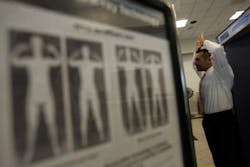Airport Body Scanners Pass Radiation Tests
Controversial full-body X-ray scanners at U.S. airports underwent more than 700 inspections last year, with all tests showing radiation levels below standards used by their manufacturer and the Transportation Security Administration, according to a USA TODAY review of the recently released reports.
While the TSA and scanner-maker Rapiscan Systems say the reports offer additional proof of safety, some critics remain unconvinced. Regardless, the TSA is in the final phases of removing the last of Rapiscan's backscatter scanners from airport checkpoints by June. Full-body scanners using a different technology that does not involve ionizing radiation, called millimeter wave, will remain in use to screen passengers.
"We're very pleased with the results of the latest batch of inspection reports," said Peter Kant, Rapiscan's executive vice president.
A TSA statement Thursday night said in part: "All scientific testing on this technology thus far has proven to be well within nationally recognized standards and safe for all passengers."
The TSA has said it was privacy concerns - not radiation - that resulted in the agency canceling its contract with Rapiscan in January. Rapiscan was unable to meet TSA's deadline to develop software to convert the nude-like images on its machines into stick-like figures.
Critics have questioned the wisdom of adding to passengers' radiation exposure when other types of scanners don't use X-rays. The governing body of the European Union has banned the use of X-ray body scanners in order "not to risk jeopardizing citizens' health and safety."
USA TODAY reviewed the latest airport X-ray scanner inspection reports, which TSA said are a response to a February 2011 Freedom of Information Act request filed by the newspaper. The reports, covering radiation tests from December 2011 through December 2012, showed radiation measurements below Rapiscan's standard of 5 microrem, though the amount of radiation measured varies by machine.
Copyright 2013 Gannett Company, Inc.All Rights Reserved

